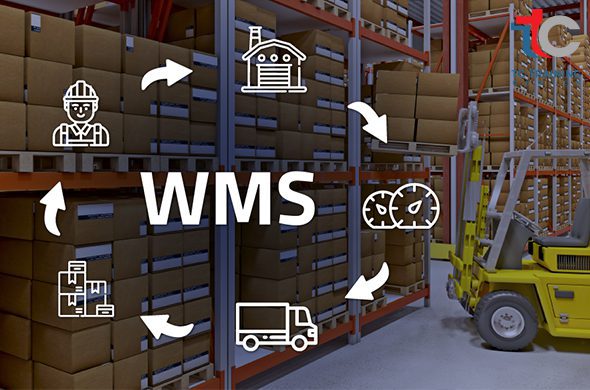Warehouse Management
Start time
Finish time
Address
Course price

The idea of the program
At present, stores play a critical role in ensuring a high level of customer service and overall logistics performance. Stores effectively reduce supply chain deficiencies and effectively improve logistics services as well as inventory management accuracy.
The role of today’s ideal stores is to reduce storage costs and improve customer service at the same time.
The principles and regulations that will be discussed in this training program are applied in warehouse departments by the best companies in the world
Program Goals:
- Understand the concept of warehouse management and its importance efficiently
- Knowledge of administrative organization of warehouse management
- Identify inventory control and identify assigned tasks efficiently
- Ability to plan inventory and set levels efficiently
- Ability to control the movement of varieties efficiently
- Ability to participate in inventory efficiently
- Identify the uses of computers in the field of inventory control
- Identify the means of manual and mechanical handling
- Identify the means of security and safety of stores
- Ability to write inventory control reports and manage stores efficiently
Impact of training on the institution:
- Increasing levels of product availability and customer service in light of the ever-increasing needs
- Studying the relationship of warehouse management and stock control to the company’s operations and activities
- Analysis of key areas of warehouse operations
- Identify and understand the KPI
- Success in improving the company’s core processes
- The organization will be more healthy and productive when it has efficient operations of warehouse management and inventory control leading to the availability of superior customer services as well as availability of products
Effect of trainee training:
- Acquire the skill of performing an analysis of stock and stored processes
- Gain productivity improvement skills in all processes
- Acquire the skill of choosing warehouse equipment
- Gain the skill of safe business practices
- Identify the financial benefits of effective warehouse management and inventory management
- Be able to understand and apply improvements after the workshop to improve existing work
- Identify the role and importance of warehouse management and inventory in the supply chain
For whom this program:
- Those who wish to develop their abilities to understand the concept of logistics and manage chains and get the most benefit to manage their stores
- Managers and Executives who wish to ensure that they are implementing best practices in current methods of performing and managing the warehouse operations
- Those who wish to gain the benefits and benefits of managing warehouse assets in more effective ways
- Those involved in inventory planning and control
- Those who work in jobs other than logistics and warehouse management and wish to expand their knowledge of logistics and warehouse activities
Outlines
First day
- Warehouse management concept
- Importance of storage function
- Practical and economic importance
- Planning and organizational importance
- Operational importance
- The main objectives of the storage function
- Conditions necessary to achieve the objectives of warehouse management
- The negative effects of lack of interest in stores
- Types of stores and their classification
- Types and types of stored materials
- Practical applications
Relationship of department stores with other departments
- Production management
- Sales Administration
- Inventory control management
- Service and maintenance management
- Traffic management
- Finance management
Concept, objectives and importance of inventory control
- Inventory control functions
- Administrative management of inventory control
- Factors influencing internal management of inventory control
- Administrative dependency of inventory control
Second day
Procedures of receipt and exchange in stores
- Receipt procedures
- Temporary receipt of items.
- Final receipt of items.
- Exchange procedures
- Powers of disbursement of items / materials
- Exchange operations from warehouses
- Material return procedures
Inventory planning
- The concept and importance of inventory planning
- Types of inventory plans
- Inventory plan elements
- Equations for the calculation of quantities and their value
- Practical application
- Costs associated with inventory
- Follow inventory plans
- Models used in stock plan follow-up
- Determine inventory levels
- Minimum stock
- The upper limit of the stock
- Practical application
- Importance of reserve stock and scientific methods to calculate it
- Recent trends in storage
Third day
Methods of classification and coding of materials
- Classification according to the class relation of the manufacturing process
- Classification by frequency movement (FSN) or frequency of purchase
- Classification by Category Use (ABC) (Triple Stock Analysis)
- Classification by unit price
- Classification by category importance for VED use
- Classification by difficulty of getting items SDE
- Classification by sources of supply
- Cross-sectional classification
- Practical exercises
Methods of coding materials
- Advantages of coding system
- The symbols used in the encoding
- Methods of calcification
- Characterization properties
What is inventory?
- Importance of inventory
- Inventory types
- Total inventory
- Total continuous inventory
- Partial inventory
- Sudden inventory
- Inventory implementation requirements
- Inventory procedures
- Reasons for differences
- Practical applications
Fourth day
Importance of warehouse planning
- How to plan the stores and the optimal use of all available space
- Interior design of stores
- Means of handling manual and mechanical materials
- Foundations of selection of handling equipment
- Training workers on the means of handling
The concept of security and safety in stores
- Causes of accidents in stores
- Fire, its causes, limitation
- Damage stored materials and work to protect them
- Methods of prevention
- Security and peace programs
- Quantitative measures for evaluating security and safety programs
- Practical applications
Fifth day
Stagnant inventory, diagnosis, effects, and disposal methods
- The role of warehouse management in handling idle inventory
- Causes of damage and loss of inventory and how to reduce them
Define warehouse reports
- Types and importance of warehouse reports
- The importance of using the computer in the field of inventory control
- The use of computers in the field of warehouse business
- Practical applications
- Lessons learned from the training program and how to apply them in improving and developing the productivity of the work environment of the participants




